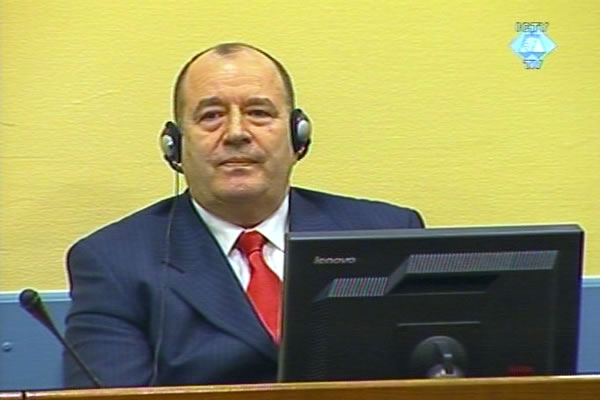Home
‘HUMANITARIAN AID’ FOR KRAJINA POLICE
Contradicting the prosecution’s claims that the Serbian State Security Service funded the Krajina police, a protected witness called by Franko Simatovic’s defense contended that the reserve police officers were paid by the companies where they normally worked, while the regular police were paid from the donations and were sometimes paid in goods from humanitarian aid
 Mico Stanisic in the courtroom
Mico Stanisic in the courtroom Franko Simatovic’s defense continued today with the cross-examination of protected witness DFS 014. The witness began his evidence in mid-December 2011; his evidence was interrupted because of the three-week winter recess at the Tribunal. In the examination-in chief, the witness denied that the commander of the Knin special unit, Captain Dragan Vasiljkovic, had ties with the Serbian State Security Service. In the first half of the 1990s, the two accused – Jovica Stanisic and Franko Simatovic – were chiefs of the Serbian State Security Service.
Stanisic’s defense counsel Wayne Jordash strove to refute the prosecution’s claim that Serbia and its secret service funded the Krajina police in 1990 and 1991. Jordash put it to the witness that the police station in Knin received money from local companies and from various donors. The witness explained that the reserve police officers were paid by the companies where they normally worked, while the regular police were paid from the donations by Krajina citizens. Sometimes they were paid in food and other goods from humanitarian aid.
The defense counsel tried to prove that the JNA played a key role in the events in Krajina by quoting parts from Ratko Mladic’s diary. Mladic was the military commander in the area at the time. The parts from Mladic’s diary shown by the defense indicate that in the summer of 1991 the JNA tried to mediate between the conflicting sides and somehow reach a peaceful solution. The witness confirmed this, but said that the army soon went on the offensive, took control of Krajina and placed the Territorial Defense under his control.
Again as in the examination-in chief in December 2011, the court was in closed session for most of the time. The witness’s occupation and position he held at the relevant time were not disclosed to protect his identity. The witness only said that in the summer and fall of 1991 he was in a village near the site where the JNA units were stationed and met with Ratko Mladic from time to time.
As the hearing drew to a close, the prosecutor began cross-examining the witness. The cross-examination is expected to be completed tomorrow.
Linked Reports
- Case : Stanisic & Simatovic
- 2011-12-15 SIMATOVIC DISOWNS ‘CAPTAIN DRAGAN’
- 2011-12-14 WHO OWNED CAPTAIN DRAGAN?
- 2011-12-13 FRANKO SIMATOVIC’S DEFENSE OPENS ITS CASE
- 2012-01-11 CAPTAIN DRAGAN – A SOLDIER IN KRAJINA OR SERBIAN STATE SECURITY AGENT?
- 2012-01-17 ARKAN’S CLERK TESTIFIES IN SIMATOVIC’S DEFENSE
- 2012-01-18 ROLE OF SERBIAN MUP IN EASTERN SLAVONIA
